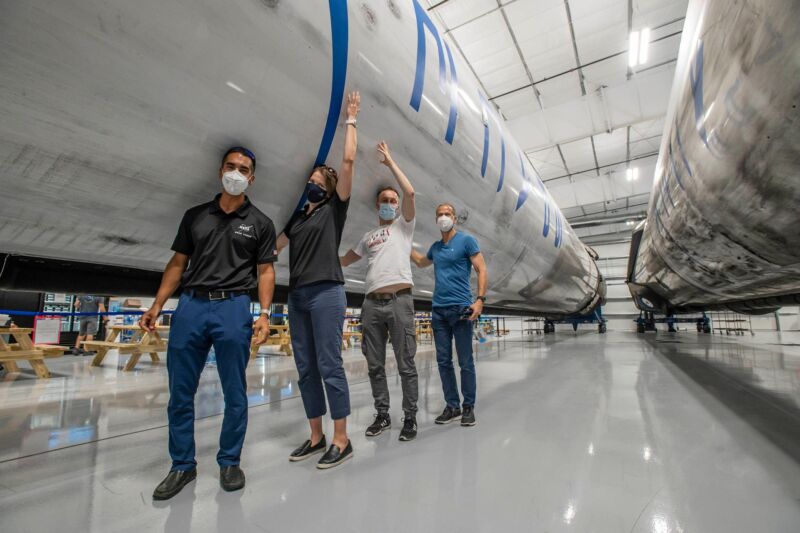

Astronauts in Europe ask for their own independent crew spacecraft
source link: https://arstechnica.com/science/2022/02/european-astronauts-call-for-development-of-a-crewed-spacecraft/
Go to the source link to view the article. You can view the picture content, updated content and better typesetting reading experience. If the link is broken, please click the button below to view the snapshot at that time.

aller dans l'espace —
Astronauts in Europe ask for their own independent crew spacecraft
"Our inaction would further impact European industrial competitiveness."
Eric Berger - 2/16/2022, 2:53 PM

European astronauts have been flying into space since 1978, when a German named Sigmund Jähn climbed aboard a Soyuz spacecraft and traveled to the Salyut 6 space station for a week.
Over the next four decades, dozens of European astronauts would fly on vehicles operated by Russia and the United States to various space stations. Most recently, French and German astronauts have launched to the International Space Station aboard SpaceX's Crew Dragon vehicle.
These astronauts, Thomas Pesquet and Matthias Maurer, both praised the Crew Dragon vehicle's smooth spaceflight and the reusable nature of the rocket. They had no complaints. But as a new "manifesto" makes clear, European astronauts would like to have their own independent means of reaching the International Space Station.
Released publicly on Wednesday, the document says that European leaders must soon decide whether the continent will accelerate its efforts to remain in the "leading ranks" of spacefaring nations.
"While Europe is still at the forefront of many space endeavors, such as Earth observation, navigation, and space science, it is lagging in the increasingly strategic domains of space transportation and exploration," the manifesto states. "Europe’s Gross Domestic Product is comparable to that of the United States’, but its joint investment in space exploration does not reach even one tenth of NASA’s."
Russia has the Soyuz crew vehicle, China has the Shenzhou spacecraft, and NASA has SpaceX's Crew Dragon. Moreover, within a few years, the US space agency should add the Orion spacecraft and Boeing's Starliner capsule to its fleet of human spaceflight vehicles. India also seeks to develop and demonstrate a crewed transportation system to low Earth orbit within the next two years.
So where does that leave Europe? According to the Association of Space Explorers-Europe, which represents European astronauts, it means the continent needs to develop its own crewed spaceflight vehicle. Otherwise, Europe will be subject to the whims of NASA, Russia, and private companies such as SpaceX, the astronauts say. Moreover, by riding on SpaceX vehicles, they will only enrich competitors to Europe's space industry.
Advertisement
"If we miss this unique chance to challenge the status quo, we will have to continue procuring human space transportation from other actors, with no guarantees that our needs and values will be a priority," the manifesto states. "We will be paying customers in a position of weakness, repeating the mistakes of the past in other strategic domains, which left us dependent on external players for our energy requirements or Information Technology development. Our inaction would further impact European industrial competitiveness: European taxpayers’ money would be used to advance industrial competitors from abroad."
The manifesto comes at a time when the new director-general of the European Space Agency, Josef Aschbacher, is pushing for more ambitious programs. Now Aschbacher has brought the most powerful public relations tool at his disposal, European astronauts, to his cause in a visible way. (The astronauts are employees of the European Space Agency.)
One counterargument to this manifesto will probably be that Europe has always gone its own way in space and should continue to do so. Why focus on building yet another crew transportation system, this viewpoint goes, when the European Space Agency could be focused on doing meaningful things in space? After all, building a new crewed spacecraft will be a very expensive and time-consuming process.
The manifesto was released on the same day that the European Space Agency is holding a Space Summit in Toulouse, France, to discuss its strategy for topics such as space exploration and addressing climate change. French President Emmanuel Macron is among the speakers. If the response to a crew transportation system is positive, Aschbacher will probably present it to the member nations of the European Space Agency at the Ministerial Council meeting in Paris in November. This is where funding decisions would be made.
If European member states grant funding for a crew vehicle, there would be big questions, such as whether it would launch on the Ariane 6 rocket or some other new rocket; and which space agency member nations would be responsible for building the spacecraft. It may take as long as a decade for a new spacecraft to be designed, tested, and flown. This will depend on various factors, including funding and whether Europe seeks a basic capsule like Soyuz or something larger and more capable like Crew Dragon.
Recommend
About Joyk
Aggregate valuable and interesting links.
Joyk means Joy of geeK